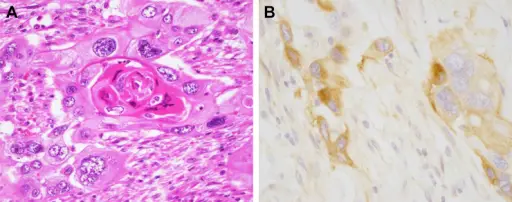Urothelial carcinoma of the renal pelvis is a tumor originating from the urothelium of the renal pelvis, ranging from benign papillomas to invasive urothelial carcinomas.
What is the Pathology of Urothelial Carcinoma of the Renal Pelvis?
The pathology of urothelial carcinoma of the renal pelvis is:
-Etiology: The cause of urothelial carcinoma of the renal pelvis is environmental factors, tobacco smoking, chronic infections and heredity.
-Genes involved: Unknown.
-Pathogenesis: The sequence of events that lead to urothelial carcinoma of the renal pelvis result from multifactorial processes.
-Morphology: The morphology associated with urothelial carcinoma of the renal pelvis shows nodular irregular growth.
-Histology: Malignant urothelial cells.
How does Urothelial Carcinoma of the Renal Pelvis Present?
Patients with urothelial carcinoma of the renal pelvis typically have a male-to-female ratio of 3:1. present at the age range of 70 to 80 years. The symptoms, features, and clinical findings associated with urothelial carcinoma of the renal pelvis include hematuria, flank pain dysuria, irritative voiding, weight loss, anorexia, and flank mass.
How is Urothelial Carcinoma of the Renal Pelvis Diagnosed?
Urothelial carcinoma of the renal pelvis is diagnosed through laboratory studies such as urinalysis, basic metabolic panel, LFTs, and CBC count. Imaging studies such as excretory urography.
How is Urothelial Carcinoma of the Renal Pelvis Treated?
Urothelial carcinoma of the renal pelvis is treated by medical therapy- chemotherapeutic agents, radiation therapy, and surgical therapy- nephroureterectomy.
What is the Prognosis of Urothelial Carcinoma of the Renal Pelvis?
The prognosis of urothelial carcinoma of the renal pelvis is fair. Five-year survival rates vary from 50% to 70%.



